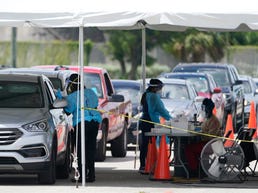
The Food and Drug Administration issued full authorization Monday for the Pfizer-BioNTech COVID-19 vaccine. Soon, millions of Americans will face a confusing, difficult task: How in the heck do you pronounce Comirnaty?
That's the brand name for the Pfizer-BioNTech vaccine. It's pronounced "co-MER-na-tee" according to Scott Piergrossi, president of creative for the Brand Institute, which crafted the name.
It's a little easier to say than BNT162b2, the research name of the vaccine while it was first being studied, but not much.
Why Comirnaty?
According to the companies, it "represents a combination of the terms COVID-19, mRNA, community, and immunity."
Let's break that down:
- co = COVID-19 (which in turn stands for COronaVIrus Disease 2019, the year it was discovered)
- mirna = mRNA, the snippets of genetic code that tell cells to build proteins. In this case, the proteins on the COVID-19 spike protein
- ty = some combination of community and immunity.
"That's what I love about Comirnaty, it hits so many of the key points we were trying to convey," Piergrossi said.
If you don't like Comirnaty, and BNT162b2 doesn't trip off your tongue, you can always try tozinameran.
Yeah, we thought not.
But in case you want to, that one's pronounced "toe-zuh-NAH-mer-an."
That's the generic name for Comirnaty.Like all pharmaceutical generic names overseen by the World Health Organization, it had to be crafted according to strict nomenclature rules.
Generic drug or vaccine names come in two parts. The first part is something the drug company gets to make up, in this case "tozina."
"It's got to be a 'blank canvas,'" Piergrossi said. "WHO requests that the prefix be meaningless. It can't be a marketing tool."
The suffix "meran" is used for mRNA vaccines, just as "caine" is the suffix for local anesthetics and "ast" is for anti-asthma drugs.
The Brand Institute began working on names for the vaccine in April 2020, when its German office contacted BioNTech, which is based there. (BioNTech is pronounced Bye-ON-tech, not Bye-oh-N-tech.)
Coming up with pharmaceutical names involves lots of money and database searches, Piergrossi said.
"We're contending against hundreds of thousands of existing names, and any new brand name has to be dissimilar from everything else in those databases," he said.
There are lots of considerations, including screening for name similarities, intellectual property and internet domain availability
When a list of finalists is created, a cultural review is done.
"We do a linguistic screen in over 40 languages to make sure there's nothing offensive or misleading," Piergrossi said. "It's a disaster check, to make sure you're not going to have any embarrassing situations."
Comirnaty was announced in December when the European Commission issued conditional marketing authorization for the vaccine, but the FDA doesn't allow the use of trade names for drugs until they're fully approved.
More COVID-19 vaccines are in the regulatory pipeline, so more tongue-twister names are coming.
The brand name of the Moderna vaccine is slated to beSpikevax, according to Piergrossi. The AstraZeneca vaccine's is Vaxzervia.
"There is a certain whimsical nature to pharmaceutical names," Piergrossi said.

Source link









